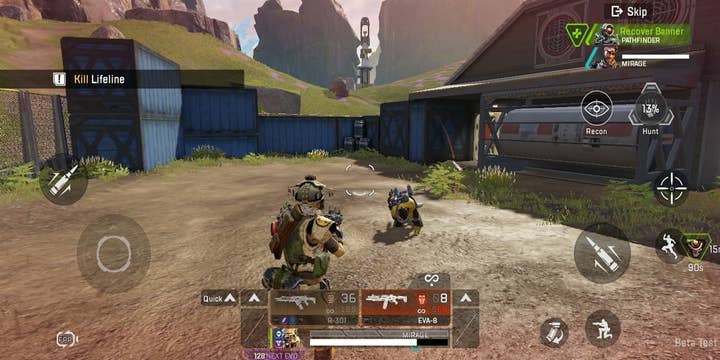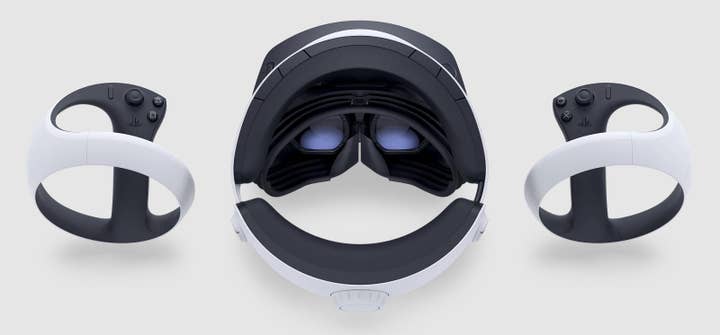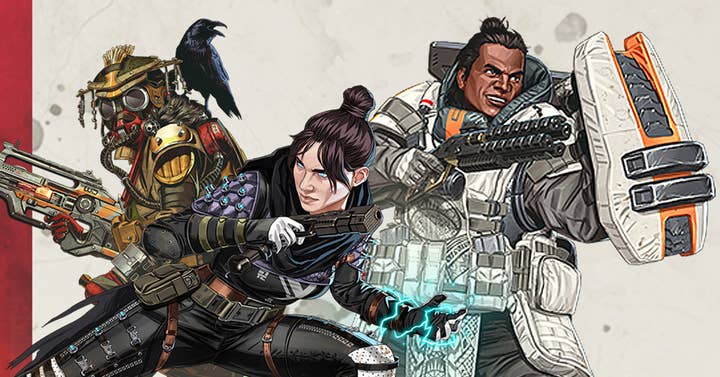What's going on with EA on mobile? | This Week In Business
Following the surprise shutdown of Apex Mobile and the scrapping of Battlefield, the publisher's earnings call gives more insight to its plans on smart devices
Sign up for the GI Daily here to get the biggest news straight to your inbox
While we find ourselves experiencing a wave of announcements that online games are closing down, perhaps the most surprising was EA's decision to scrap Apex Mobile, the smartphone spin-off of its battle royale Apex Legends.
Despite being named Game of the Year by both Apple and Google – and was a mobile launched that other studios could learn a lot from – the portable shooter will go offline on May 1 – not even a full year after launch. Not only that, but EA has also decided to abandon the in-development Battlefield Mobile, and shut down mobile developer Industrial Toys.
Statements about these shutdowns were light on detail, but EA CEO Andrew Wilson shared more during an earnings call earlier this week. As transcribed by Seeking Alpha, he talked investors through the company's latest financial results.
QUOTE | "Despite this strong start, the ongoing experience [of Apex Mobile] was not going to meet the expectations of our players. After months of working with our development partner [Tencent-owned Lightspeed Studios], we have made the mutual decision to sunset this version of the game. We’ve learned a great deal and have plans to reimagine a connected Apex mobile experience in the future.
"It is through these learnings, combined with a clear franchise strategy, that we’ve also made the decision to stop the development of the current Battlefield mobile title. We know our community values a deeply connected ecosystem and our team is focused on delivering the best, unified cross-platform experience for our players" - Wilson explaining to investors why the two games are shutting down and, as executives often do, using more words than is necessary to do so.
Crucially, his reference to "reimagining" Apex Mobile clarifies something that headlines of this past week might not: this is not the end of Apex Legends on mobile, more of a 'back to the drawing board' sort of moment.
Nonetheless, the two closures had investors worried to the point where at least half the questions during the earnings call's Q&A session were centered on mobile strategy. And if we go through EA's answers, we get a better sense of where the winds are heading for big publishers trying to grow their business on smart devices.
What went wrong with Apex Mobile?
The first investor asked about the lessons from this first iteration of Apex Legends on mobile, trying to understand how the title could earn the Game of the Year accolade from both Apple and Google and yet still struggle with engagement.
"We learned a great deal and plan to reimagine Apex mobile in the future"
Andrew Wilson, EA
Wilson offered a few reasons why the title didn't work out:
- The "level of immersion and complexity" to Apex Legends' gameplay, such as "verticality and team-based play," didn't quite translate to mobile as well as EA had hoped
- While the game attracted both existing and new users, it didn't retain casual players at the rate needed to continue supporting the game. Given the game's reliance on team play, having as large a userbase as possible was essential to its success
- The mobile market is challenging (although Wilson didn't elaborate on which particular challenges scuppered Apex Mobile)
QUOTE | "We know that we have the underlying ingredients to make an incredible game. We need to be thoughtful about the nature of the core game mechanics and the retention mechanics that we build into the game over time. And most importantly, as we look at the mobile market, the biggest new launches that are seeing the most success are the ones that are deeply connected to the broader franchise, where there's not always cross-play, but it's certainly cross-progression and a feeling that they are part of a single unified community and a single unified game experience" - Wilson elaborating on what's happening in the wider mobile market, while still assuring that Apex Legends can work on mobile.
His point about cross-play is worth noting. For all the battle over the years to bring down the barriers between platforms, mobile can often be somewhat separate from traditional devices – especially given the differences in computing and graphical power and, of course, input. The connection between a mobile game and its console/PC counterpart does not have to be in real-time, but most of the time the former needs to feel a part of, or at least directly connected to, the latter.
Wilson went on to say that the learnings from Apex Mobile tied directly into the decision behind scrapping Battlefield Mobile.
QUOTE | "While Battlefield had also been in development for some time and was making good progress, given the construct of that game, it also was probably going to run with some of the same challenges, and rather than continue to push against that, we wanted to come back, take a breath, reset" - Wilson quite wisely calling it quits on Battlefield before it suffers the same problems, although this does perhaps call into question the strategy of developing very similar games for different franchises.
What role does mobile play in EA's overall strategy?
Answering a question about trends in spending and engagement on mobile, EA's leadership emphasised the core truth about that sector.
QUOTE | "While the mobile market continues to be a very challenging market to find success in, it also continues to be the world's largest gaming platform and certainly has the ability to attract more players than any other platform. And so for us it will always be a very important part of our go forward franchise strategy." - Wilson reminding everyone that mobile is not a market a major company can afford to miss out on.
QUOTE | "We still perceive the mobile market to be significant. It's $100 billion. It's where Gen Z and Gen Alpha play. It's the platform they prefer. It's also a significant platform in growth geographies around the world where we are looking to expand our franchises, [it's an] incredibly important market." - COO Laura Miele later assuring another investor that EA understands the importance of mobile.
"[Mobile is] where Gen Z and Gen Alpha play. It's the platform they prefer"
Laura Miele, EA
Throughout the call, EA repeatedly said its strategy on mobile is to ensure games for smart devices feel part of its biggest franchises rather than disconnected experiences. Specifically, it said this was the plan – and where the company will ramp up its investment – for its sports franchises, as well as The Sims, Apex, Battlefield and Skate (which is due to return via a mobile game).
While Wilson did the usual spiel about the potential for growth and monetisation on mobile, he stressed that mobile offers Electronic Arts a way to get fans "to play when they are away from those core devices they have," namely PC and console.
As we've discussed a lot on this site, the world of video games is increasingly driven by engagement – and that means engaging players everywhere they go. Just because they're at work, on the bus, and so on, doesn't mean EA et al shouldn't have a way to tap into how they use their time (and, ideally, spend their money).
Wilson also emphasised that EA still has a number of mobile-native titles not connected to the publisher's bigger franchises that "perform exceptionally well," such as Star Wars: Galaxy of Heroes and Golf Clash, as well as other titles gained via the acquisition of Glu Mobile. EA will continue to invest in these, but the bulk of investment will go into its "bigger franchise play" – to the point where Wilson expects to "probably invest less" in new startup standalone titles.

Wait, what about Glu?
Given that EA spent $2.1 billion on the long-running mobile publisher just two years ago (in fact, two years exactly as of next week), one investor was concerned about what the focus on this "bigger franchise play" meant for Glu and its casual titles.
Laura Miele said EA particularly focuses on shooters, sports and casual creation genres – and Glu has titles in all three (yes, even shooters. Do you not play Deer Hunter 2018?).
"We know that we have the underlying ingredients to make an incredible game"
Andrew Wilson, EA
She also emphasised that Glu is now fully integrated into EA, so its experience with titles like Cabot Fashion Design Home will help with building the future of The Sims on mobile.
Wasn't there a Lord of the Rings mobile game in the works?
Yes, there was. Sorry, there is. Announced in May 2022, The Lord of the Rings: Heroes of Middle-Earth taps into the Star Wars: Galaxy of Heroes formula – and one investor wanted to know whether there was an update on this game.
Miele confirmed the game is still in development – handled, in fact, by the team behind Galaxy of Heroes. She said that the Star Wars game is one of EA's most successful mobile games to date at over $1 billion in net bookings.
Heroes of Middle-Earth is currently in soft launch, with a full launch expected this year. If it can open as many wallets as Galaxy of Heroes, it hopefully means it'sunlikely to suffer the same fate as Apex Mobile.
Why is any of this important?
An increasing number of major games firms in the traditional console/PC space are turning to mobile. As Wilson and Miele said, mobile is huge – accounting for more than half the revenues in the global games market.
But it's a tough space in which to gain share; the top mobile games, for example, are almost always the same. When we do Year In Numbers, it's a safe bet that the highest-grossing mobile games will include Honor of Kings, PUBG Mobile, Genshin Impact, Roblox and Candy Crush Saga – or all five of them.
And if we just look at the headlines of the past year, we can see how seriously the biggest publishers and platform holders are taking mobile games.
Take-Two's solution was buying Zynga, Microsoft is trying to buy Activision Blizzard (which owns Candy Crush creator King), and Ubisoft is trying to bring Rainbow Six to mobile, as well as Assassin's Creed. Even Sony is trying again, hiring Kabam and Zynga veterans and working with experienced studios on titles like this month's Ultimate Sackboy, and Nintendo has reiterated that mobile is a good way to promote its key IP to new audiences.
The point is all the major companies see mobile as the next major growth opportunity, if only for the size of that audience. Estimates from Statista say Apple alone sells hundreds of millions of smartphones per year – it took Nintendo five years to sell 100 million Switch units
So while the impending shutdown of Apex and Battlefield Mobile may have come as a surprise, it should come as no shock that this just one step back with EA hoping to take two steps forward next time – much to the chagrin of anyone who would prefer another Titanfall.

The rest of the week in review
QUOTE | "[We have] not cut PlayStation VR 2 production numbers" - Sony refutes a recent Bloomberg report in a statement to GamesIndustry.biz.
STAT | $9.6 billion - Sony's revenue for the past quarter, driven in no small part by God of War Ragnarok.
STAT | 11 million - Number of copies God of War Ragnarok has sold since its November launch.
QUOTE | "Nominations for Game Changers are now open. Permanently." - We're making our series dedicated to people making the industry a better place a permanent fixture of GamesIndustry.biz.
QUOTE | "Reading, writing, taking walks, taking a bath, playing golf. We want to recognize those moments as necessary for good work to happen" - Wayfinder Games CEO Fia Tjernberg tells us about the new studio's ethos on work-life balance as the ex-DICE team prepare to make its first online RPG.
QUOTE | "If you don't have Apple Arcade or Netflix Games, the best idea is to release the mobile version between nine to 18 months after the PC release" - Playdigious CEO Xavier Liard offers a crash course on porting your game to mobile.
QUOTE | "Harmful to developers and consumers" – US governments description of Apple and Google's current practices, such as preventing users from accessing alternative app stores or forcing studios to use the platform holder's payment systems, as it calls for changes to iOS and Android.
QUOTE | "We take our commitment to comply with local laws and regulations in India seriously" - Google is updating Android and Google Play to allow third-party payment systems, among other things, following a directive from the Competition Commission of India.
QUOTE | "We continue to respectfully appeal certain aspects of the CCI’s decisions" - Google subtly letting everyone know it's not happy about said directive.
QUOTE | "It’s simply impossible for us to make those kinds of systemic changes in the live game while continuing to support it" - Knockout City director Jeremy Russo on the decision to shut the game down on June 6.
QUOTE | "While we've expanded Crayta significantly since launch, we've unfortunately not seen quite enough growth for us to justify continuing" - Unit 2 Games on which it's shutting down Crayta on March 3.
QUOTE | "This project has been a labor of love to create a new experience in a popular and highly competitive genre for games" - Iron Galaxy as it announced battle royale Rumbleverse will shut down on February 28. As you can tell, it's not been a great week for live service games.
STAT | 3 - Number of games-centric scholarships announced this week, thanks to the first two recipients of USC's Gerald A. Lawson Fund and a partnership between EA and the Berklee College of Music.
STAT | 60 - Number of staff laid off from Tilting Point, representing 14% of its workforce.
STAT | 20% - Percentage of NCsoft West's workforce that has been laid off. CEO Jeff Anderson has also left.
STAT | 95 - Number of 343 Industries staff affected by the recent Microsoft layoffs. As you can tell, it's not been a great week for simply working in the games industry.
STAT | 40 - Number of Ubisoft staff that took part in last week's half-day strike, which union Solidaires Informatique tells GamesIndustry.biz will be followed by "more strikes at key moments in the games' production".
STAT | $7.23 million - January takings of Dwarf Fortress. Bit of a step-up from the $15,000 it made in December, before its commercial release.
Sign up for the GI Daily here to get the biggest news straight to your inbox



